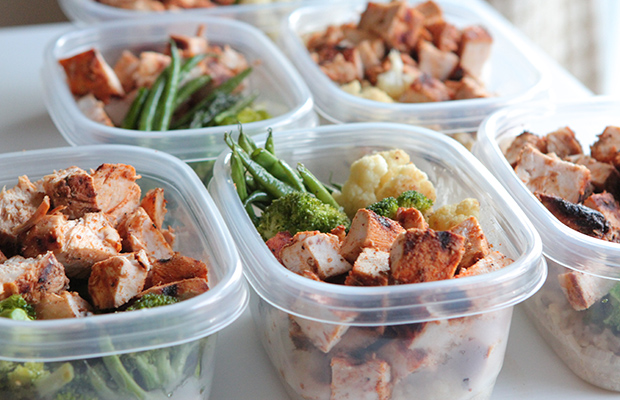
Routine vs. Variety – Which Is Better For Fat Loss?
February 21, 2016 // Nutrition
You want to burn fat. You want to be lean. You want to feel great.
You’re ready to work on your nutrition, but you’re not sure what’s best for you.
Do you need to follow an eating routine?
Do you need to meal prep?
Will you get bored? What about eating out?
Is it better to add variety?
What’s best for YOU?
The Answer: It depends.
[Womp Womp Womp]
Listen, of all the illogical concepts marketed by the health industry, the most misunderstood principle is that every individual reacts differently to health pursuits.
Finding the right eating formula for fat loss is person-specific.
Both routine and variety eating styles have their benefits, so it’s important to understand the differences.
ROUTINE EATING
Benefits: Diminished hunger & anxiety; Measured food intake; Controlled blood sugar (no dips in energy); Removes any chance of missed meals or lack of food availability; Can help reduce bloat or gas; Stimulates muscle repair/growth and increased fat loss; Great for time-senstivite goals; Easy to adhere to a schedule/habits
Drawbacks: Lack of diversity (missing key nutrients from other food sources), Boredom, Not always socially acceptable, Interferes with social activities (especially eating out at restaurants); Limits exposure to new foods; Removes randomness (and intrigue) with food
Energy Required: Minimal
Cost: Affordable (buy in bulk)
Execution: Cooking large batches of meals once to twice a week; Measuring, storing, and eating the meals from portable containers
Perfect For: The busy person, the terrible chef, the on-the-go worker, the easily-overwhelmed individual, the beginner to health, the goal-obsessed, and the I’m-broke-and-can’t-eat-healthy person
VARIETY EATING
Benefits: High intake of many different vitamins, minerals, & phytonutrients (cancer fighters); Allows for new freedoms; Explores different elements of and relationships to food; Greater flexibility on eating options; Builds and solidifies lifelong health principles through learning one’s body
Drawbacks: Progress is subjective; Can cause anxiety through lack of structure, Time consuming, Can feel “lost” at times, Requires a strong mind-body awareness
Energy Required: Moderate (constantly making and assessing decisions)
Cost: Moderate (can vary based upon choices)
Execution: Following a set of principles (person-specific) when constructing meals that align with the life the person wants to live (person-specific) that nourishes the body and keeps everything balanced
Perfect for: The entertainer, the kitchen explorer, the foodie, the social butterfly, the “maintenance stage” individual, and the novice/advanced health conscious person
MY TAKE
Again, fat loss is person-specific. I have spent years following a routined eating structure, and it certainly helped in many ways. I learned a lot about myself, time management, structure, preparation, etc. I was able to automate my nutrition by adhering to the routine and removing any decision making from my day-to-day habits.
I found this lifestyle to be rewarding for achieving health objectives, such as reaching a set weight, improving leanness, and building strength for performance. However, I felt extremely limited in my social experiences, which is an important element to my identity. I barely ate outside of my apartment and I knew what my food was for the next MONTH.
While I had control over my fitness, I felt imprisoned because of my dedication to health objectives. This realization helped me assess what’s important to me and what I would later define as the life I wanted to live.
I’ve recently transitioned into a variety eating lifestyle, which has been incredibly rewarding in its own right. I am now able to enjoy many different social engagements without hesitation or fear of “falling off”. I enjoy the freedoms of decision making and the flexibility to eat however I want while listening to my body’s cues and feedback loops. This eating lifestyle works for me at this point in my life.
Health, in my eyes, is the evolution of self. A person’s nutrition is specific to their background, age, their culture, their upbringing, their pursuits, and their habits. I can certainly see how each lifestyle can be challenging for many different people, and that’s why I highly recommend you use the above guide to determine which eating style is best for you.
Start by identifying where you are right now in your life and build a plan of action based upon where you fit in the above guide.